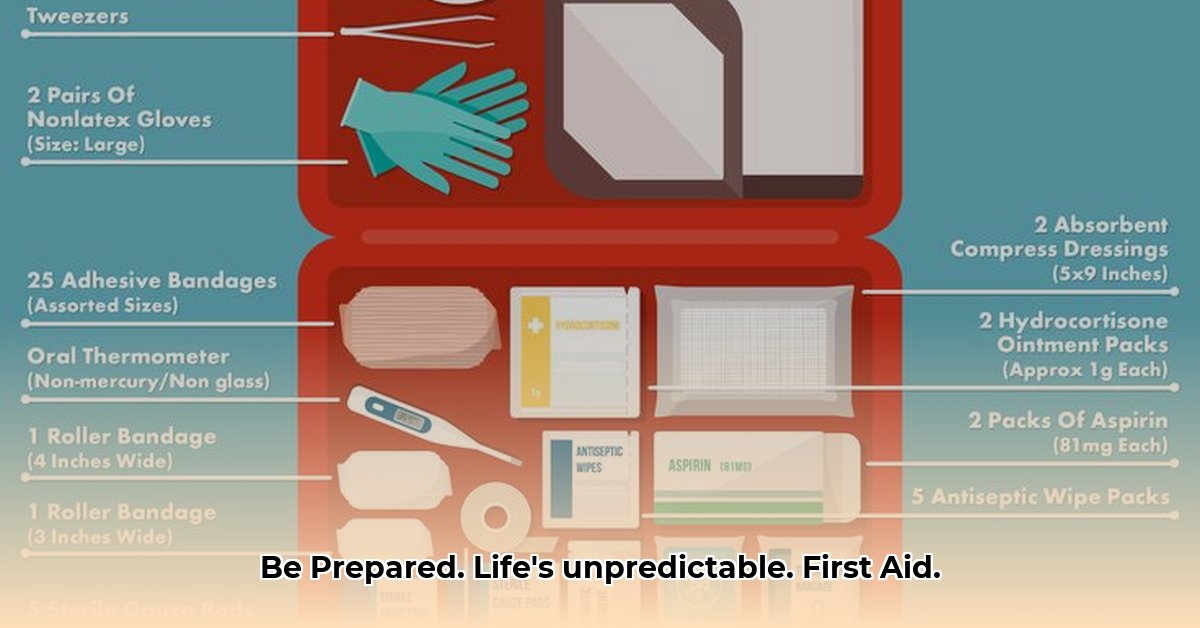Accidents happen. Whether it’s a scraped knee on the playground or a blister on a hike, being prepared is key. This comprehensive guide walks you through building a first aid kit for various situations, from home and car to travel and hiking. We’ll cover the essentials, explain their uses, and offer tips for staying safe and healthy on any adventure.
Wound Care: Your First Line of Defense
Effective wound care minimizes infection risk and promotes healing. Here’s what you need:
Basic Wound Care Supplies
- Adhesive Bandages (assorted sizes): From minor cuts to larger scrapes, having a variety of sizes is essential.
- Sterile Gauze Pads: Protect wounds, absorb blood, and cushion injuries.
- Roller Bandages: Secure gauze, provide support for sprains, and can be used for makeshift slings.
- Medical Adhesive Tape: Keeps dressings securely in place.
- Antiseptic Wipes: Conveniently clean wounds and help prevent infection. While hydrogen peroxide is a common disinfectant, some studies suggest it may also damage healthy tissue, so it’s probably best used sparingly.
- Antibiotic Ointment (like Neosporin or Bacitracin): Creates a barrier against infection and promotes healing.
- Hydrocortisone Cream: Soothes itchy bug bites, rashes, and minor skin irritations.
- Sterile Saline Solution: Gently rinses wounds and removes debris, minimizing irritation.
Essential Tools
- Scissors: Cut bandages, clothing, or other materials as needed. Blunt-tipped scissors are recommended for kits used around children.
- Tweezers: Remove splinters, ticks, and other foreign objects.
- Safety Pins: Secure bandages, create slings, or close torn clothing.
- Non-Latex Gloves: Protect yourself and the injured person from contamination.
Pain and Allergy Relief: Managing Discomfort
From headaches to allergic reactions, managing discomfort is crucial for a speedy recovery.
- Pain Relievers:
- Ibuprofen (Advil, Motrin): Reduces inflammation and pain.
- Acetaminophen (Tylenol): Relieves pain and fever.
- Aspirin: Can help with pain and may be recommended by some experts for potential heart attack symptoms, but consult your doctor before using it for this purpose, especially if you have any underlying health conditions.
- Antihistamine (Benadryl, Zyrtec, Claritin): Alleviates allergy symptoms like sneezing, itching, and watery eyes.
- Calamine Lotion: Soothes itchy skin from insect bites, poison ivy, and other irritations.
- Instant Cold Packs: Reduce swelling and numb pain for sprains, strains, and other injuries. Some experts suggest alternating between cold and heat therapy, so a reusable hot pack might also be beneficial.
Other Medical Essentials: Often Overlooked, Always Important
These items are critical for comprehensive care:
- Digital Thermometer: Accurately monitor body temperature.
- Syringe or Medicine Cup: Measure liquid medications precisely, especially for children.
- CPR Face Mask or Barrier Device: Provides a protective barrier during CPR.
- First Aid Manual/Quick Reference Guide: Access step-by-step instructions for various first aid procedures, even offline.
Emergency Preparedness: Be Ready for the Unexpected
Beyond everyday injuries, being prepared for emergencies can be life-saving.
- Emergency Blanket (Space Blanket): Retains body heat in cold or wet conditions.
- Bottled Water and Non-Perishable Food: Essential for survival situations.
- Flashlight with Extra Batteries: Provides light during power outages or nighttime emergencies.
- Portable Phone Charger: Keeps your phone powered up for communication.
- Hand-Crank Radio: Access emergency broadcasts and weather updates.
- Whistle: Signal for help in emergencies.
- List of Emergency Contacts: Keep a physical list of important phone numbers.
Building Your Kit: Tailoring to Your Needs
Home First Aid Kit
This kit covers common household injuries and illnesses. Include all the items mentioned above, plus:
- Prescription Medications (if applicable): Keep a small supply of essential prescriptions, along with dosage information.
Car First Aid Kit
Designed for roadside emergencies and minor injuries while traveling. Include the items listed in the Wound Care, Pain and Allergy Relief, and Other Medical Essentials sections. Consider adding:
- Road Flares or Reflectors: Alert other drivers to your presence in case of a breakdown.
- Jumper Cables: Restart a dead car battery.
Travel & Hiking First Aid Kit
Tailored for adventures and outdoor activities. Include the core essentials listed above, plus these additions:
- Water Purification Tablets or Filter: Ensure access to safe drinking water.
- Blister Treatment: Protect against and treat blisters caused by friction.
- Sunscreen and Insect Repellent: Shield your skin from sun and insect bites.
- Multi-Tool or Pocketknife: Useful for various tasks.
- Duct Tape: Incredibly versatile for repairs and first aid.
- SAM Splint: Stabilize fractures and other injuries, particularly helpful in remote areas.
- Wound Packing Gauze: Control bleeding by applying direct pressure to serious wounds.
- Tourniquet: For controlling life-threatening bleeding in extreme situations (requires proper training).
For hikers in areas with venomous snakes:
- Snake Bite Kit: While their effectiveness is debated, some hikers choose to carry these kits.
Important Reminders:
- Check Expiration Dates: Regularly inspect your kit and replace expired items.
- Storage: Keep your kit in a cool, dry place, away from direct sunlight and out of reach of children.
- Training: Consider taking a first aid and CPR course to enhance your preparedness and confidence.
- Personalization: Adapt your kit to your specific needs, activities, and environment. For example, individuals with allergies might need to include an epinephrine auto-injector (if prescribed by a doctor).
- Professional Advice: This information is for general knowledge and does not replace professional medical advice. Consult with a healthcare provider for any health concerns or before making decisions about your health or treatment. Always seek professional medical help when necessary.
This comprehensive guide empowers you to build a first aid kit that meets your unique needs. Remember, being prepared is about having peace of mind and the ability to respond effectively in any situation.
- Food Making Kits Bring Easy, Fun Homemade Dishes to Your Kitchen - February 5, 2026
- Cooking Kits Make Mastering New Recipes Fun for Everyone - February 4, 2026
- Leak-Proof Glass Food Containers with Locking Lids Keep Food Fresh - February 3, 2026










